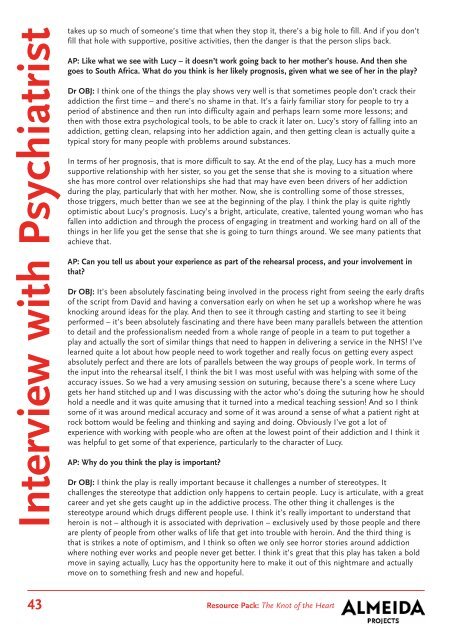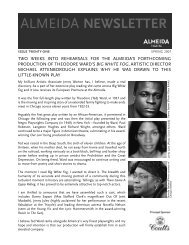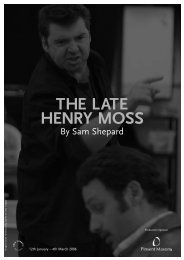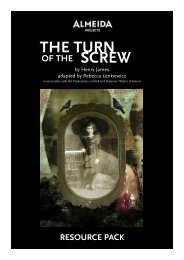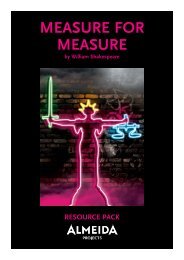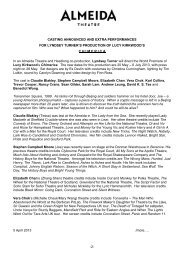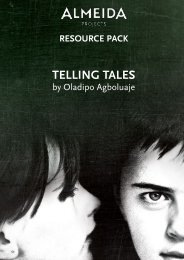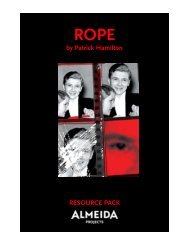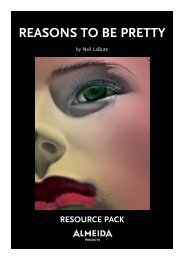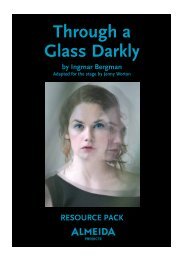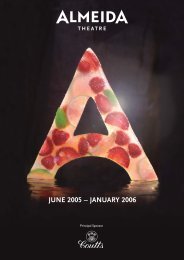KNOT HEART - Almeida Theatre
KNOT HEART - Almeida Theatre
KNOT HEART - Almeida Theatre
- No tags were found...
You also want an ePaper? Increase the reach of your titles
YUMPU automatically turns print PDFs into web optimized ePapers that Google loves.
Interview with Psychiatristtakes up so much of someone’s time that when they stop it, there’s a big hole to fill. And if you don’tfill that hole with supportive, positive activities, then the danger is that the person slips back.AP: Like what we see with Lucy – it doesn’t work going back to her mother’s house. And then shegoes to South Africa. What do you think is her likely prognosis, given what we see of her in the play?Dr OBJ: I think one of the things the play shows very well is that sometimes people don’t crack theiraddiction the first time – and there’s no shame in that. It’s a fairly familiar story for people to try aperiod of abstinence and then run into difficulty again and perhaps learn some more lessons; andthen with those extra psychological tools, to be able to crack it later on. Lucy’s story of falling into anaddiction, getting clean, relapsing into her addiction again, and then getting clean is actually quite atypical story for many people with problems around substances.In terms of her prognosis, that is more difficult to say. At the end of the play, Lucy has a much moresupportive relationship with her sister, so you get the sense that she is moving to a situation whereshe has more control over relationships she had that may have even been drivers of her addictionduring the play, particularly that with her mother. Now, she is controlling some of those stresses,those triggers, much better than we see at the beginning of the play. I think the play is quite rightlyoptimistic about Lucy’s prognosis. Lucy’s a bright, articulate, creative, talented young woman who hasfallen into addiction and through the process of engaging in treatment and working hard on all of thethings in her life you get the sense that she is going to turn things around. We see many patients thatachieve that.AP: Can you tell us about your experience as part of the rehearsal process, and your involvement inthat?Dr OBJ: It’s been absolutely fascinating being involved in the process right from seeing the early draftsof the script from David and having a conversation early on when he set up a workshop where he wasknocking around ideas for the play. And then to see it through casting and starting to see it beingperformed – it’s been absolutely fascinating and there have been many parallels between the attentionto detail and the professionalism needed from a whole range of people in a team to put together aplay and actually the sort of similar things that need to happen in delivering a service in the NHS! I’velearned quite a lot about how people need to work together and really focus on getting every aspectabsolutely perfect and there are lots of parallels between the way groups of people work. In terms ofthe input into the rehearsal itself, I think the bit I was most useful with was helping with some of theaccuracy issues. So we had a very amusing session on suturing, because there’s a scene where Lucygets her hand stitched up and I was discussing with the actor who’s doing the suturing how he shouldhold a needle and it was quite amusing that it turned into a medical teaching session! And so I thinksome of it was around medical accuracy and some of it was around a sense of what a patient right atrock bottom would be feeling and thinking and saying and doing. Obviously I’ve got a lot ofexperience with working with people who are often at the lowest point of their addiction and I think itwas helpful to get some of that experience, particularly to the character of Lucy.AP: Why do you think the play is important?Dr OBJ: I think the play is really important because it challenges a number of stereotypes. Itchallenges the stereotype that addiction only happens to certain people. Lucy is articulate, with a greatcareer and yet she gets caught up in the addictive process. The other thing it challenges is thestereotype around which drugs different people use. I think it’s really important to understand thatheroin is not – although it is associated with deprivation – exclusively used by those people and thereare plenty of people from other walks of life that get into trouble with heroin. And the third thing isthat is strikes a note of optimism, and I think so often we only see horror stories around addictionwhere nothing ever works and people never get better. I think it’s great that this play has taken a boldmove in saying actually, Lucy has the opportunity here to make it out of this nightmare and actuallymove on to something fresh and new and hopeful.43Resource Pack: The Knot of the Heart


